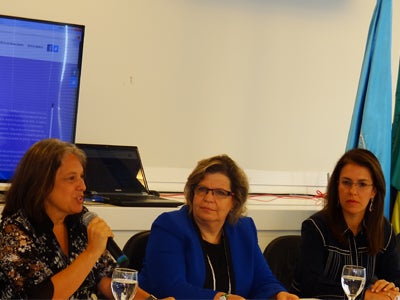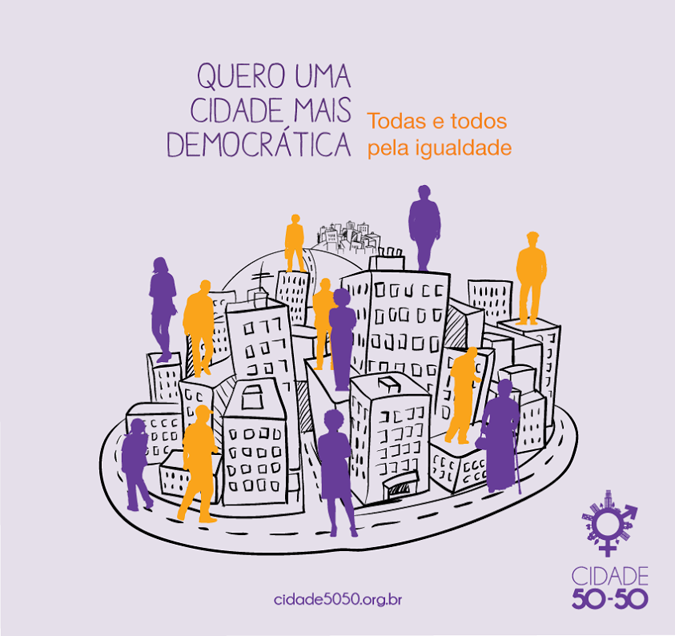City 50-50 Platform is a tool to encourage gender parity in power spheres
UN Women launches www.cidade5050.org.br, candidates will be able to make public commitments to gender equality. The project was developed in a partnership between UN Women Brazil, the Supreme Electoral Court (TSE), the Patrícia Galvão Institute and the Research Group on Democracy and Inequality at the University of Brasilia (Demodê/UNB). It has institutional support of Congress in Focus, and #MeRepresenta and In Press GroupDate:
A place where candidates can make commitments to gender equality and voters can get information to help them define their vote. The digital platform "City 50-50: All for Equality", available in www.cidade5050.org.br aims to encourage debate on equal rights between women and men in local elections this year. It arises from the understanding that a society can only be called democratic when there is equal participation between men and women.
The project was developed in a partnership between UN Women Brazil, the Supreme Electoral Court (TSE), the Patrícia Galvão Institute and the Research Group on Democracy and Inequality at the University of Brasilia (Demodê/UnB). It has institutional support of Congress in Focus, #MeRepresenta, In Press Group.
For the UN Women Representative in Brazil, Nadine Gasman, "candidates –men and women- need to commit to tackle gender inequalities and racism, to create the conditions for all people to exercise their citizenship and improve the quality of life, respecting the diversity of Brazilian municipalities. For democracy to be effective, a gender perspective needs to be incorporated to local public policies, while ensuring and increased participation of women, in their diversity, so that under equal conditions, women participate more and better in Brazilian politics and the decision making process in general."
The Minister of the Superior Electoral Court, Luciana Lossio, highlighted the group of measures to ensure women political empowerment. "We had a major trial at the Superior Electoral Court that buoyed the condemnation to all political parties that do not comply with the 10% allocation of radio and TV space to encourage women´s participation. Now we are joining in a partnership with UN Women, to seek a solution to this problem of the Brazilian Electoral Politics."
Use of the platform - candidates of the 5,568 Brazilian municipalities, which already have registered their candidatures with the TSE may, through the platform, register and make public commitments to promote women's rights during the election campaign. For this purpose, they should complete the form available at the link www.cidade5050.org.br and send their candidatures to UN Women.

Voters, in turn, when accessing the digital platform will be able to identify their candidates’ proposals for this topic, and afterwards make the elected accountable.
The "City 50-50" platform arises of the Sustainable Development Goals (ODS), adopted by the Member States of the UN, and the global initiative "Planet 50-50 in 2030: step it up for gender equality", launched by UN Women.

Municipal elections are a propitious time for this dialogue. It is the time when candidates of all around the country debate with society about their agenda and priorities for the city for the next four years.
According to Jacira Melo, executive director of Patrícia Galvão Institute, "City 50-50” is a platform that calls on candidates to commit in the present to build the cities of the future as equal places for women. Cities are the territory where differences are manifested in all its richness. City 50-50 is a call for the state to increase its commitment and ability to formulate quality public policies to overcome every step of gender inequality in the political, economic, social, environmental and cultural areas. "
Commitment Areas - By accessing the platform, the candidates can make commitments in six major areas:
- Governance and Finance: refers to public management with a gender perspective.
- Economic Empowerment: ensures that the talents, skills and experience of women can be developed to its fullest.
- Political Participation: promotes opportunities and conditions for women to participate in public life and politics of the cities on an equal footing with men.
- Education for equality: includes issues related to gender equality and race in education and in everyday social life.
- Eliminating Violence against Women: promotes strengthening the service network for women victims/survival of violence, with quality and respect, in public and private spaces.
- Health: draws attention to the implementation of municipal services to ensure appropriate care for women and girls in their diversity.
Women in the elections in 2016 - Among the more than 144 million Brazilian voters who will vote in October, 52% are women. However, only 31% of the candidates running for office (Mayors, Vice Mayor and City Council) are women - the percentage is within the law, which requires a minimum of 30% women candidates.
For this elections, 52 municipalities have only women as candidates for city council, according to a survey conducted in mid-August this year by the TSE. Only men compete for Mayor in 3,815 of the 5,568 municipalities, equivalent to 68% of the total.
Currently, women occupy 10% of the municipalities and represent 12% of councilors in municipalities.